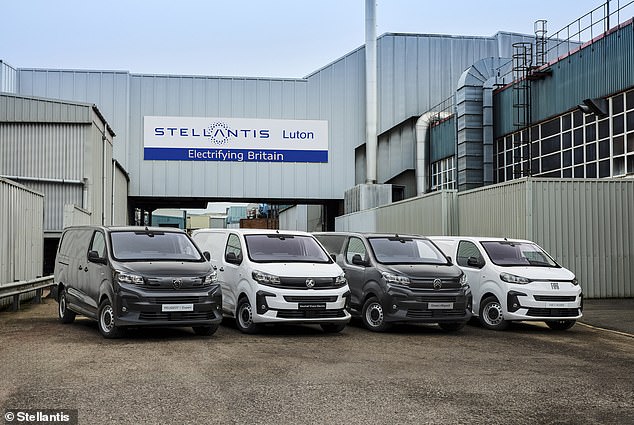Vauxhall’s parent company Stellantis has announced plans to close its van plant in Luton, days after it warned the government that it could slash production in Britain over Labour’s tough electric vehicle sales targets.
The firm, which also owns the Peugeot, Citroen and Fiat brands, says it wants to consolidate production at its Ellesmere Port factory.
Ellesmere Port is already set up to produce electric vehicles following a £100million investment. The motoring giant is now set to ditch its plans to convert Luton into another EV production plant exclusively for commercial vehicles.
The plan to close the Luton plant puts more than 1,100 jobs at risk – and brings to an end 120 years of manufacturing history at the plant, which first opened in 1905.
Stellantis has said it intends to relocate ‘hundreds of jobs’ to the Cheshire port around 140 miles away.
The announcement came days after ministers met with car bosses to discuss the contentious zero emissions vehicle (ZEV) mandate – which requires car firms to sell a certain amount of electric cars each year or face financial penalties.
Stellantis said today’s announcement came ‘within the context of the UK’s ZEV mandate’ – months after it warned it could close its plants as it was squeezed by the government to ramp up EV production and sales.
At present, the plan to shutter Luton is a ‘proposal’ – but if enacted, the car giant says it will offer relocation packages to staff willing to move. For those who want to stay in Luton, it will offer retraining and help finding a new job.

Vauxhall parent firm Stellantis says it will close its Luton van factory (pictured) next year to consolidate production at its Ellesmere Port plant

Ellesmere Port in Cheshire is already primed to produce electric vehicles. The move comes after Stellantis warned it may cut UK production in response to EV sales targets
Immediately after the announcement, a government spokesperson said: ‘While it’s encouraging to see Stellantis investing in the future of its Ellesmere Port plant, we know this will be a concerning time for the families of employees at Luton who may be affected.
‘We have a longstanding partnership with Stellantis and we will continue to work closely with them, as well as trade unions and local partners on the next steps of their proposals.
‘The government is also backing the wider industry with over £300 million to drive uptake of zero emission vehicles and £2 billion to support the transition of domestic manufacturing.’
It is the latest and unlikely to be the last bad news for the UK’s car industry after Ford announced it would take the scythe to 800 jobs in administration and product design in the UK.
There is growing discontent among car manufacturers at anti-petrol and diesel rules designed to cut carbon emissions from vehicles – including in Britain, where dealerships say drivers aren’t interested in electric models.
Under the UK’s zero emission vehicle (ZEV) mandate, 22 per cent of all vehicles sold this year have to be BEVs – either purely electric or hydrogen-fuelled.
As of October, battery electric vehicles made up 18.1 of the UK’s new car sales market – suggesting firms are falling massively short.
Demand has also grown for plug-in hybrid and hybrid vehicles, which combine an electric motor with a traditional engine. These come with lower road tax, but do not contribute to the ZEV mandate – good for motorists, not so much car makers.
The Tories pushed a 100 per cent target back to 2035 – but Labour looks set to reinstate hitting that goal by 2030 after being elected in July. It may grant hybrids a stay of execution to 2035.
Car makers who miss the target will be fined £15,000 and £18,000 per non-compliant car and van, respectively.
But they have called on the government to ease off on the targets as damage is already being done to Britain’s manufacturing industries.

UK transport secretary Louise Haigh held crunch talks with car makers last week on the electric vehicle scheme amid concerns the targets were unrealistic

Germany’s Chancellor Olaf Scholz has pushed back against EU mandates requiring car makers to reduce the emissions of their vehicles by 15 per cent by next year

Germany is home to some of the world’s biggest car firms including Mercedes-Benz, Audi and BMW (pictured: the BMW plant in Leipzig)

The UK government wants 22 per cent of all new vehicles sold to be purely electric by the end of the year – a target that does not look set to be met
It comes as Germany has joined a growing backlash against fining car makers who miss net zero targets – suggesting the firms should be allowed to keep the money to invest in cutting emissions.
Chancellor Olaf Scholz has hit out at the European Union’s zero emission vehicle plans, which require manufacturers to reduce the emissions from their new cars and vans by 15 per cent compared to 2021 levels by next year.
The quickest way for firms to do this is to reduce the production of petrol and diesel cars and encourage people to swap to electric vehicles – but firms say motorists aren’t biting and warn jobs could be at risk if UK and EU mandates aren’t eased.
However, it will be the car firms that face penalties if they fail to shift enough battery electric vehicles (BEVs) and plug-in hybrid electric vehicles (PHEVs) to hit the 15 per cent target.
This grow to a 55 per cent reduction in car emissions and 50 per cent vans by 2030. EU autocrats then want a 100 per cent reduction – i.e. no purely fossil fuelled cars and vans sold at all – by 2035.
Germany has a vested interest in protecting car firms from fines: its car industry is solely responsible for an estimated five per cent of GDP, and is home to huge names including Audi, BMW, Volkswagen and Mercedes-Benz
Mr Scholz told reporters on Monday he wanted firms to retain any fines that would be levied so it can be invested in working towards the EU’s targets.
‘The money must remain in the companies for the modernisation of their own industry, their own company,’ he said.
Ford last week said it would cut 800 jobs in the UK as it cut back on the production of some of its electric models – after pledging to go fully electric by 2030, scrapping cars like the Fiesta while resurrecting the Capri as an electric ‘coupe SUV’.
The jobs will largely go in administrative and product development roles, with hands-on manufacturing unlikely to be affected. However, Ford says it is assessing ‘future opportunities’ at the Dagenham engine plant.
It said the vehicle emissions trading scheme, which allows car makers to buy and sell credits from each other as they work towards the target, was ‘unworkable’ and called for called for ‘greater flexibility’ in the scheme’s goals.
Nissan has warned of ‘irreversible’ damage to Britain’s motor industry if the mandate was not eased, after scaling back its global profit estimates by 70 per cent and announcing global job cuts. It is not clear if its UK plants will suffer.
It comes as Jaguar has ‘sunsetted’ its petrol models after pledging to go fully electric by 2030 – keeping only the electric I-Pace on the production line as it rolls out a hugely divisive rebrand.
Car firms and dealerships are having to slap electric cars with huge, unsustainable discounts in order to shift them in big numbers as consumers tighten their wallets.
Data supplied to This is Money by Auto Trader earlier this month suggested some EVs were being discounted by as much as £16,000 to get them off of forecourts.
Established manufacturers also face intense competition from abroad, particularly China, which has flooded the market with budget EVs from manufacturers such as BYD and MG that drastically undercut their prices.
Robert Forrester, chief executive of car dealership chain Vertu Motors, warned in September car firms were also having to deliberately delay the delivery of non-electric cars into next year to get close to the ZEV mandate goal.
‘It’s almost as if we can’t supply the cars that people want, but we’ve got plenty of the cars that maybe they don’t want,’ he said.

A Ford worker at the company’s Dagenham plant. The company plans to cut 800 jobs, largely in administrative and product development roles

Mr Scholz, seen here visiting a BMW plant in Munich in December last year, has called for the fines that would be levied to be spent by manufacturers on reducing emissions instead

Research by This is Money suggests some of the biggest car firms and groups are falling behind on targets for battery electric vehicle sales
UK transport secretary Louise Haigh held crunch talks with car makers last week on the next steps for the zero emission vehicle mandate. She has insisted the government will hold firm on the scheme.
The Tories scrapped a £5,000 grant for electric vehicle purchases in June 2022, which had been credited with boosting sales of non-fossil fuelled cars.
A Government spokesperson said following the talks: ‘Recognising the global challenges the industry has been facing, ministers underlined the Government’s commitment to working constructively and in close partnership with the sector as we support the transition to electric vehicles by 2030.
‘The UK automotive sector now has the fastest growth of zero emission vehicles of any major European market, and we’re providing more than £2.3 billion to support industry and consumers in making the switch, with 57 new public electric vehicle chargers added on average each day.’
In Germany, meanwhile, economy minister Robert Habeck has suggested the country could even cover off fines for two years to enable manufacturers to catch up with regulation.
Hildegard Mueller, head of German car maker lobby group VDA, said: ‘In view of the difficult economic situation, the lack of demand for e-mobility from consumers and the continued inadequate framework conditions, further burdens from possible fines in 2025 must be avoided.’
Official EU figures suggest around a quarter of all cars sold in Germany last year were either pure electric or plug-in hybrid electric vehicles.
Uptake in other EEA countries was highest in Norway, where 91 per cent of all new cars were BEVs or PHEVs.









